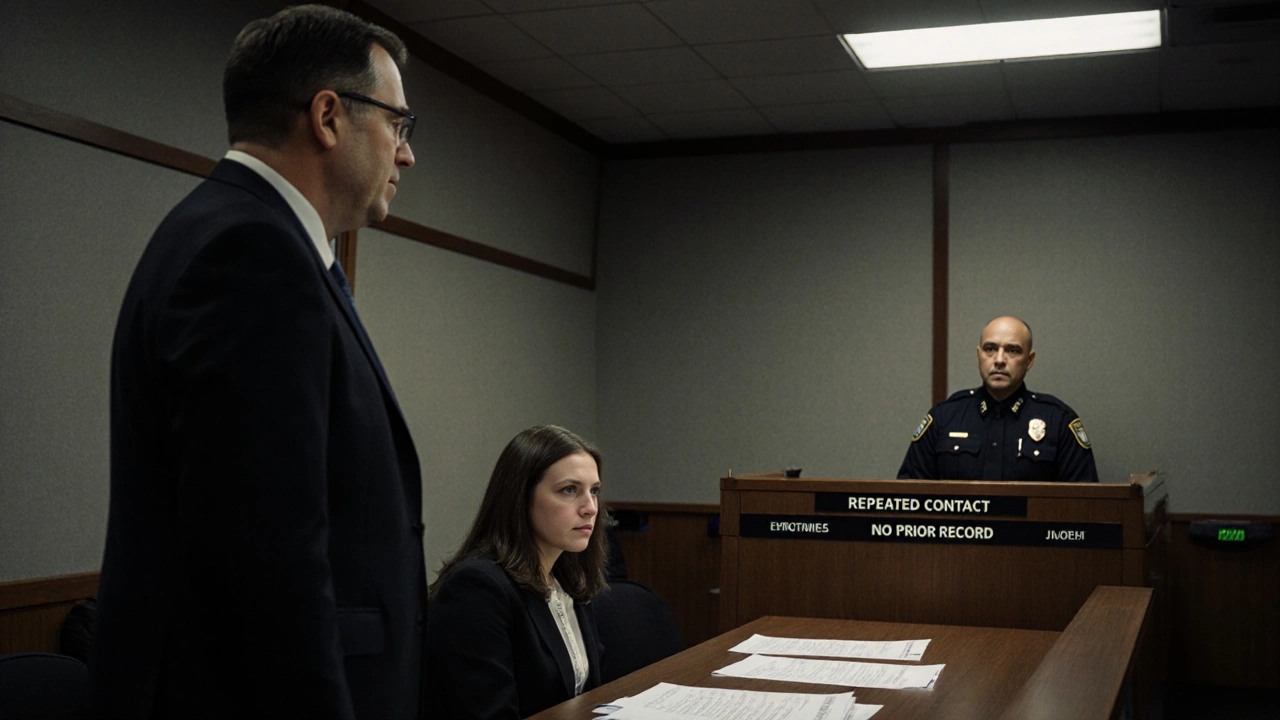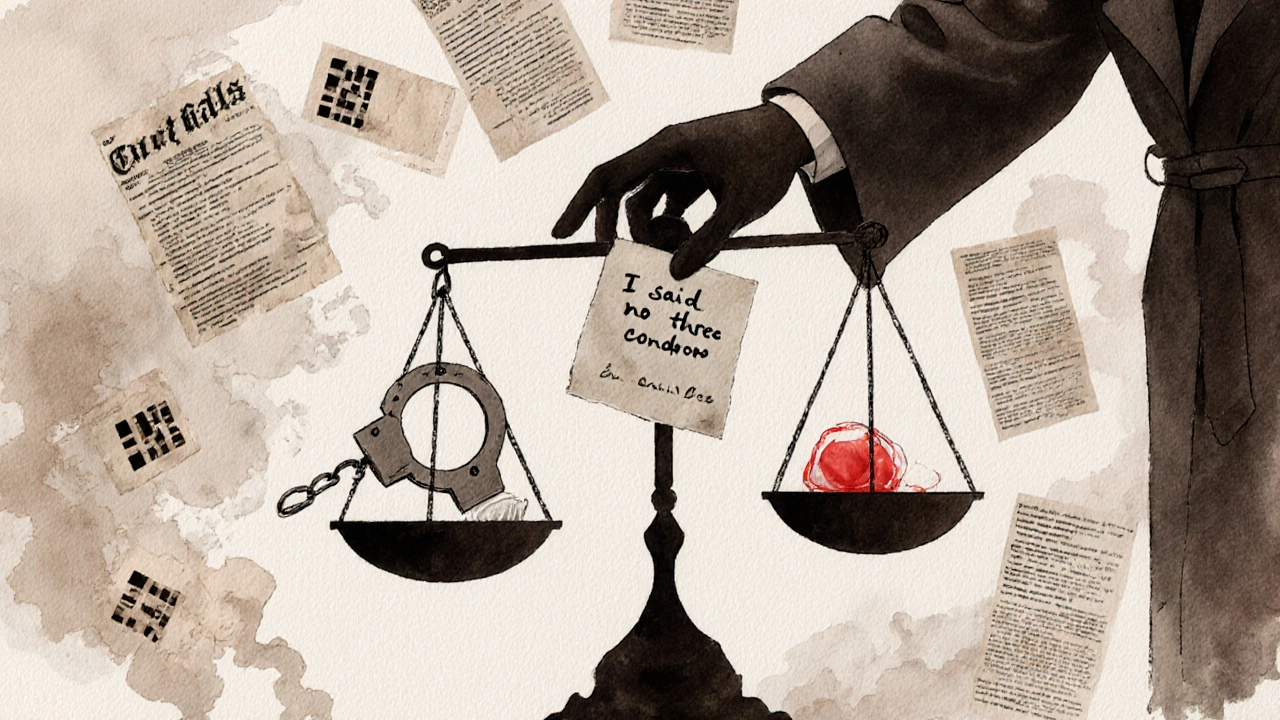When police target sex workers through undercover operations, it’s not always about stopping crime-it’s about building cases. In cities across Australia, the U.S., and Europe, sting operations have become a routine tool in sex work enforcement. But not every arrest holds up in court. Many of these cases collapse because of entrapment-a legal defense that’s been used successfully by sex workers and their lawyers for decades.
What Exactly Is Entrapment?
Entrapment isn’t just about being approached by police. It’s about being pushed into doing something you wouldn’t have done otherwise. The law doesn’t punish people for being in the wrong place. It punishes people who choose to break the law. If an officer creates the opportunity, pressures you, or uses threats or excessive persuasion to get you to agree to sex for money, that’s entrapment.Take a real example from Perth in 2023. A woman was approached by an officer posing as a client. He offered $200 for sex, then kept returning-texting, calling, showing up at her door-until she finally agreed. She was arrested. But the court dismissed the case. Why? The officer didn’t just wait for a customer-he became the sole reason she engaged in the act. She had no prior record, no history of soliciting, and no intention to do so before he started pressuring her.
That’s the key: entrapment requires two things. First, the government must have induced the crime. Second, the person must not have been predisposed to commit it. Courts don’t care if you’ve been arrested before. They care if you were already looking to do this, or if the officer made it happen.
How Sting Operations Actually Work
Most sting operations follow a pattern. Officers pose as clients online or on the street. They use fake profiles, burner phones, and scripted lines. Some wait quietly for someone to approach them. Others go further-they initiate contact, negotiate price, set time and place, and sometimes even provide condoms or money upfront.In 2022, a study by the University of Melbourne tracked 87 sex work arrests from police stings in Victoria and Western Australia. In 62% of those cases, the officer was the first to initiate contact. In 41%, they offered money before the worker responded. In 29%, the officer returned multiple times over days or weeks before an arrest.
These aren’t random encounters. They’re targeted campaigns. Police departments often track where sex workers congregate-online forums, public parks, certain bus stops-and send officers there repeatedly. The goal isn’t just to catch people. It’s to get enough arrests to justify funding, show public results, or meet performance targets.
Why This Matters for Legal Defense
If you’re arrested in a sting, the prosecution will say you offered sex for money. That’s the charge. But your defense doesn’t have to argue innocence. It has to prove the officer crossed the line.Here’s what works in court:
- Proof the officer initiated contact first
- Text messages or call logs showing repeated pressure
- Witnesses who saw the officer approach you
- History (or lack of it) showing you never solicited before
- Any evidence the officer offered money, set the price, or provided tools (like condoms or a location)
In 2021, a case in Adelaide involved a transgender woman who had been approached by an officer three times over two weeks. Each time, he offered $150. She said no. On the fourth time, he said, “I’ll give you $200 if you just come with me.” She went. She was arrested. Her lawyer pulled the call logs, showed the repeated offers, and highlighted her clean record. The judge threw out the case. “The officer created the crime,” he wrote. “This isn’t enforcement. It’s manufacture.”

Common Myths About Entrapment
There are a lot of misunderstandings. Here are the biggest ones:- Myth: “If you said yes, you’re guilty.”
Truth: Saying yes doesn’t matter if you were pushed into it. The law protects people from being tricked into crime. - Myth: “Police can do whatever they want undercover.”
Truth: Courts have repeatedly ruled that police can’t create crime. They can only catch it. - Myth: “You can’t use entrapment if you’ve been arrested before.”
Truth: Past arrests don’t prove predisposition unless they were for the same exact crime under similar conditions. - Myth: “Only lawyers can prove entrapment.”
Truth: You can gather your own evidence-texts, screenshots, witness names. Even a friend who saw the officer approach you can help.
What to Do If You’re Targeted
If you’re approached by someone who might be undercover:- Don’t agree to anything on the spot. Say you need time to think.
- Take screenshots of messages, record calls if legal in your state, save numbers.
- Don’t go to private locations unless you’re sure it’s safe. Public places are harder for police to claim you were “tricked” into.
- If arrested, say nothing. Ask for a lawyer. Don’t explain. Don’t apologize. Just say, “I want to speak to my lawyer.”
- Reach out to sex worker advocacy groups. They often have legal networks and know which lawyers handle these cases.
Many people think reporting police misconduct is pointless. But in 2023, a coalition of sex worker groups in Sydney filed a formal complaint after 14 sting cases were dismissed due to entrapment. The police department reviewed its training. Some officers were reprimanded. Change happens when people speak up.
Legal Precedents That Support You
Courts have been clear: police can’t manufacture crime.In the U.S., the Supreme Court case Sorrells v. United States (1932) set the standard: “The line between temptation and inducement is not always easy to draw.” Since then, dozens of cases have thrown out charges where officers overstepped.
In Canada, the 2018 case R. v. Mack ruled that “a person who is induced by a government agent to commit a crime cannot be convicted.” That ruling is cited in Australian courts too.
Even in places where sex work is illegal, entrapment remains a valid defense. It’s not about whether the act is legal-it’s about whether the state created the crime.

Why This Defense Is Growing
More lawyers are learning how to fight these cases. More sex workers are documenting interactions. More judges are tired of seeing the same patterns.In 2024, a new protocol was introduced in Western Australia. Police must now log every undercover interaction-time, location, number of contacts, whether they initiated. This isn’t perfect, but it’s a start. It means defense lawyers can now request these logs. And when they do, many cases fall apart.
It’s not about excusing illegal behavior. It’s about stopping abuse of power. The law exists to protect people from being tricked into breaking it-not to trap them into it.
What You Can Do Now
You don’t need to be a lawyer to protect yourself. Here’s what works:- Know your rights. You don’t have to talk to police. You don’t have to answer questions.
- Save everything. Screenshots, voice memos, witness contacts.
- Connect with groups like Scarlet Alliance or SWOP (Sex Workers Outreach Project). They offer free legal referrals.
- Teach others. Share what you know. One person speaking up can change how a whole community is policed.
Sex work is criminalized in many places. But the law doesn’t give police a blank check to create crime. If you’re targeted, you’re not alone. And you have more power than you think.
Can I be arrested for just talking to someone who might be police?
No. Simply talking to someone-even if they’re undercover-is not a crime. Arrests happen only if you agree to sex for money. But even then, if the officer pressured you into it, you may have a defense of entrapment. The law doesn’t punish people for being approached. It punishes people who choose to engage.
What if I’ve been arrested before? Can I still use entrapment?
Yes. Past arrests don’t automatically mean you’re predisposed to commit the crime. Courts look at whether you were already seeking to do this before the officer got involved. If this was your first time, or if the officer pushed you repeatedly, entrapment still applies. What matters is the officer’s behavior, not your history.
Do I need a lawyer to prove entrapment?
You don’t need a lawyer to start gathering evidence, but you absolutely need one to argue it in court. Entrapment is a legal defense that requires formal procedure. A lawyer can request police logs, file motions, and present your case properly. Many legal aid groups and sex worker organizations offer free or low-cost referrals.
Can I record police officers during a sting?
In Australia, you can legally record conversations you’re part of-even with police-without their permission. This includes phone calls and in-person talks. Recordings can be powerful evidence of entrapment, especially if the officer pressures you, offers money, or insists on meeting. Always check your state’s laws, but in most places, it’s legal and highly recommended.
Why do police use sting operations if they often get dismissed?
Sting operations are used because they produce numbers-arrests, charges, convictions-that look good in police reports. They’re easy to fund, easy to publicize, and require little evidence beyond a single agreement. Courts are catching on, but many departments still rely on them because they’re low-risk for officers and high-visibility for the public. That’s changing as more cases get thrown out and more people speak out.
